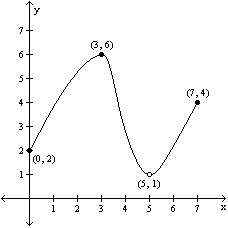Use the relative frequency method to estimate the probability. Round your answer to 2 decimal places when necessary.You count 61 heads when you toss a coin 100 times. If you don't know whether the coin is fair, what is the probability that the next toss will be heads?
A. 0.061
B. 0.5
C. 1
D. 0.61
Answer: D
You might also like to view...
Solve the problem.A stack of 10 different cards are shuffled and spread out face down. If 4 cards are turned face up, how many different 4-card combinations are possible?
A. 210 B. 2520 C. 151,200 D. 5040
Simplify.  ÷
÷ 
A. 
B. 
C. z - 6
D. 
For the graph of the function y = f(x), find the absolute maximum and the absolute minimum, if it exists.
A. Absolute maximum: f(3) = 6; Absolute minimum: f(0) = 2 B. Absolute maximum: f(7) = 4; Absolute minimum: f(0) = 2 C. Absolute maximum: f(3) = 6; Absolute minimum: f(5) = 1 D. Absolute maximum: f(3) = 6; Absolute minimum: none
Write the word statement as an equation. Use x to represent the unknown number. Do not solve.The sum of twice a number and 9 is 17.
A. 2(x + 9) = 17 B. x + 18 = 17 C. 2x + 9 = 17 D. 18x = 17